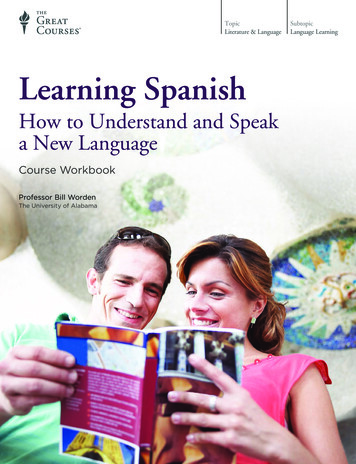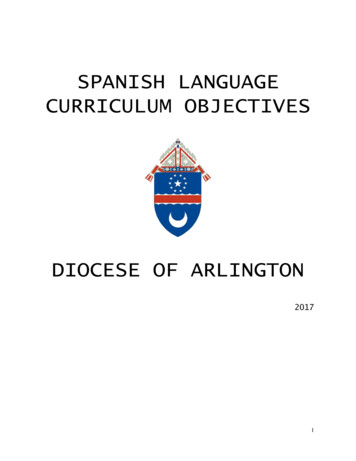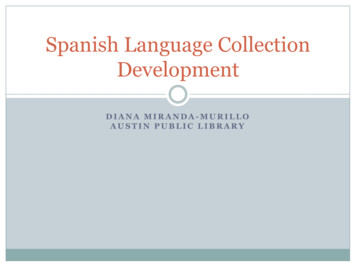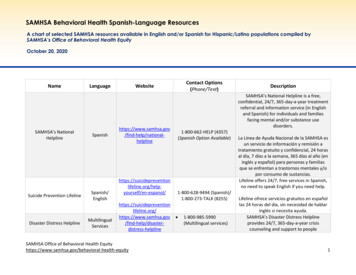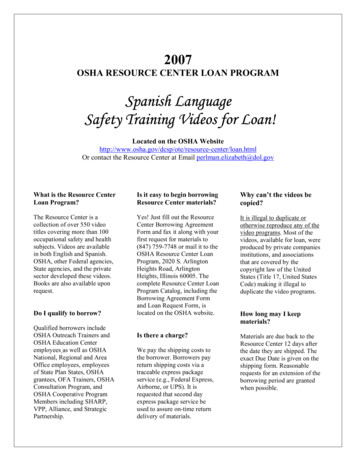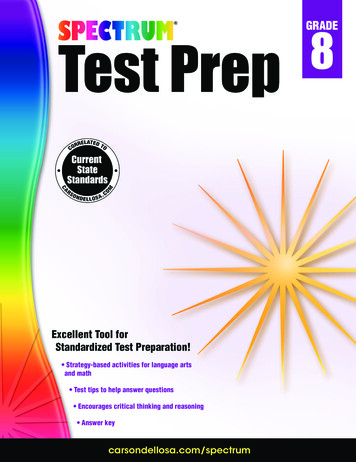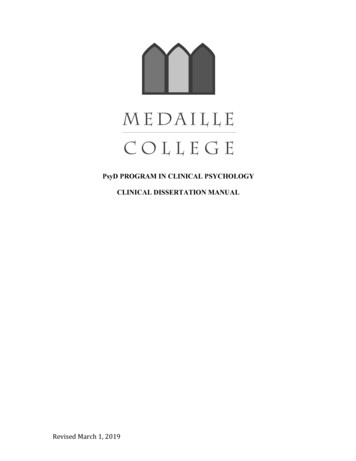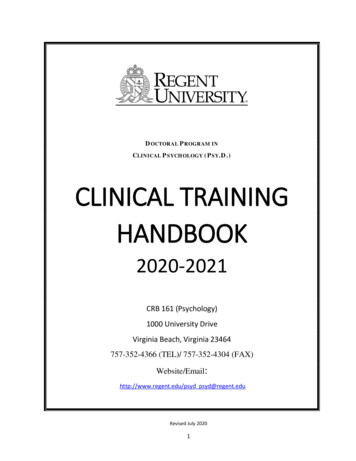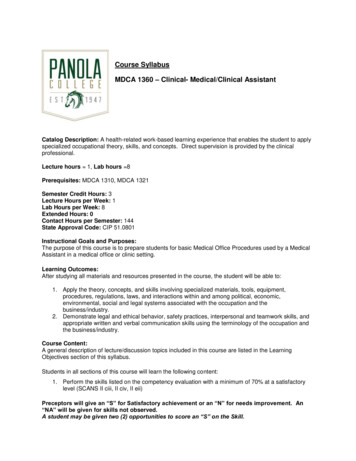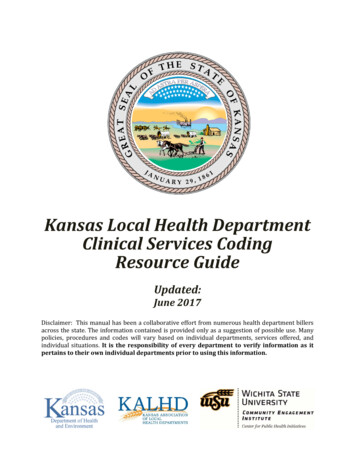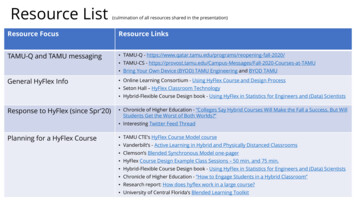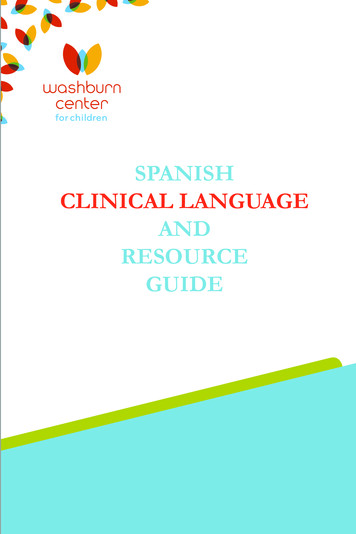
Transcription
SPANISHCLINICAL LANGUAGEANDRESOURCEGUIDE
The Spanish Clinical Language and Resource Guide has been created to enhance public access toinformation about mental health services and other human service resources available toSpanish-speaking residents of Hennepin County and the Twin Cities metro area. While every effortis made to ensure the accuracy of the information, we make no guarantees. The inclusion of anorganization or service does not imply an endorsement of the organization or service, nor doesexclusion imply disapproval.Under no circumstances shall Washburn Center for Children or its employees be liable for any direct,indirect, incidental, special, punitive, or consequential damages which may result in any way from youruse of the information included in the Spanish Clinical Language and Resource Guide.
AcknowledgementsFebruary 2015In 2012, Washburn Center for Children, Kente Circle, and Centro collaborated ona grant proposal to obtain funding from the Hennepin County Children’s MentalHealth Collaborative to help the agencies improve cultural competence in services tovarious client populations, including Spanish-speaking families. These funds allowedWashburn Center’s existing Spanish-speaking Provider Group to build connectionswith over 60 bilingual, culturally responsive mental health providers from numerousTwin Cities mental health agencies and private practices. This expanded group,called the Hennepin County Spanish-speaking Provider Consortium, meets six timesa year for population-specific trainings, clinical and language peer consultation, andresource sharing.Under the grant, Washburn Center’s Spanish-speaking Provider Group agreed tocompile a clinical language guide, meant to capture and expand on our group’s“¿Cómo se dice ?” conversations. As the Consortium proved to be an invaluabletool for resource sharing, it became clear that we should capture that information aswell. What appears in this document are our best efforts to record the language andresource information we obtained during this grant period.We are grateful for our language consultants Maria Cervantes, Mauricio Cifuentes,and Justo Garcia. Our experience of getting three different “definitive” answers onhow best to say or explain something, which sometimes included what anotherconsultant had told us not to say, demonstrated the diversity of the countriesand cultures where Spanish is spoken. It also reinforced our collective experienceof how translating the word is often just the beginning when building a sharedunderstanding with our clients.Many thanks go to the Consortium members who provided feedback and updatedinformation about their practice locations. The resource information included herereflects the most current information we had at the time of this printing. While theagencies included here offer much more than is listed, we chose to only includeservices provided in Spanish to make the guide as succinct and helpful as possible.Please contact us if you would like your information updated or added to theelectronic version of this guide. The guide will be updated every six months and isavailable online: www.washburn.org/spanishclinicalguide.We are extremely excited to share this information with you. We hope you find thisguide helpful, and we welcome your feedback.Sincerely yours,Elizabeth Franklin, MSW, LICSWTherapistFacilitator of Washburn Center’s Spanish-speaking Provider Group andthe Hennepin County Spanish-speaking Provider Consortium
Table of ContentsLanguage GuideRoles56General Clinical Terms7Emotions/Feelings7Managing ity Descriptors11Identity12Praise/Strength Descriptors12Diagnoses13Trauma-related Terms14Treatment Planning Terms16Therapeutic s18Social Functioning/Relationships19Parenting20Washburn Center Language/Kid Talk21Home-based Clinical Vernacular23Allied Services/Systems Language23Therapeutic Services Chart28
ResourcesCase Management Supplemental Information3536Children’s Therapeutic Services andSupports (CTSS) Services Supplemental Information37In-Home Therapeutic Services37School-based Mental Health Services39Groups40Educational Advocacy43Youth Development Programs44Prenatal Classes/Programs45Personal Care Assistant (PCA) Services for Children45Speech-Language Therapy46Service/Resource Navigators46Health Care Advocacy46Tenants’ Rights Education47Adult Mental Health Targeted Case Management47Adult Rehabilitative Mental Health Services (ARMHS) 47Parenting Services48Immigration Evaluations48Domestic Violence-related Programs48Sexual Assault-related Services49Chemical Dependency Treatment49Senior Services49
LanguageGuideA List of ClinicalTerminology
RolesCase Managercoordinador/a del caso/de casosClinical Social Workertrabajador/ora social clínica o en el ámbito clínicoGood explanations for the difference betweenpsychologists and social workers: Los psicólogos se enfocan más en lo que pasa adentrode una persona o en la parte interior (sentimientos oemociones, pensamientos, antecedentes) Los trabajadores sociales en el ámbito clínico seenfocan en eso pero también prestan mucha atenciónen lo que pasa entorno o en el medio ambiente,alrededor de la vida de una persona, mientras queexploran la parte interior Nosotros tratamos de entender lo que está pasandoahora en tu vida para poder identificar factores deestrés; creemos que eso nos ayude enfrentar la parteinterior más ólogo/a, da terapia y dar exámenes psicólogicosPsychiatristel/la psiquiatra, da medicina y terapiaPsychiatric NursePractitionerenfermera/o practicante en psiquiatría, asistente delpsiquiatríaSkills worker/trainerentrenador/a o facilitador/a de comportamientos ohabilidadesSocial Workertrabajador/a socialTherapistel/la terapeuta, terapista
General Clincial TermsAffectafectoFlatteneddecaído/a, aplastado/a, apachurrado/aBluntedembotado/a – not a widely used phrasealso: que no muestra muchas emociones por su cara, sucara no cambia mucho cuando sus emociones cambianElevatedelevado/a, aumentaHeal/recovercurarse, recuperarse, recobrarseMoodsentido de ánimo, estado de ánimoPersonalitycarácter, , talentos, fortalezas, que hace bien, cualidadespositivasWeaknessesdebilidadesNOT “descapacidades” – implies disabilities orpermanent deficitsEmotions/FeelingsAngerenojo, rabia, ira, oso/aAshamedavergonzado/aDepresseddeprimido/a7
Emotions/Feelings (continued)8Disgustedindignado/a, asqueado/a (more intense), enfermarse, lerepugnaNOT “disgustado” – false cognateFrustratedfrustrado/aGriefduelo, penaGuiltyculpableHappyfeliz, edadLonelysentirse solo/aMourningluto (describes a formal mourning state) – se usa “estar deluto”NumbingentumiéndoseNumbentumecido, entumido – neurological phrase that ismeaningful when applied to physical body parts or tothinking/cognitive functioning, i.e. “Entumido la mente,”does not make sense when applied to Stuckestancando/a, estancarseSome may use “te paraste,” travarse (although it can have“drug us” connotation – “me travo” can mean “I gethigh”), or metaphors of stuck objects or vehicles
TriggersNo direct translation: “Qué ocasiona causa lo que haces?”Experiencias que te causan (cierta emoción, recordar elpasado); ¿Cuál fue la razón/Qué causó ? “Yo iba por la calle y de repente percibí (olí) el perfumede un hombre y me causó tener un ataque de pánico” Disparador – literal translation of trigger, but do not usebecause it implies huge explosion Experiencias detonates is a literal translation of“triggering experiences” but does not make senseUpsetalterado/a, anaging FeelingsDeal with/Handle(implies moremastery/control)manejar, lidiarTo bear it/to endureaguantar, soportarTolerate(more neutralconnotation)tolerar, /a, nervioso/a (more emotional), inquieto/a (morephysical) exacerbado/a – usually not used because it’s older, moreflowery language9
Behavior (continued)Arousalagitación, levantamiento (elevated in positive way)NOT “excitación” – always has a sexual peractivo/a, muy activo/a, no se queda oppositionalityno direct translation – se niega, se opone, no se pone suparte/no pone de su parte, no coopera, contradictorio/a,siempre le contradiceOut of controlfuera de controlTantrumrabieta, berrincheWetting oneselfmojar uno mismo, mojarse(no), hacerse pipi,se mea/mearse – can have a crude connotationCognitive10Coherencecoherente (adjetivo), coherencia (sustantivo), tiene sentido(makes ficiente intelectual (CI)IntelligenceinteligenciaProcessingprocesar, digerir (for how brain manages information)
cimientos fundamentales del desarrollo, gran paso deldesarrolloOn trackalcanza los acontecimientos (cabalmente), a tiempo, en loesperadoDelayedatrasado, retrasado/a (has connotation of disability or lowfunctioning)Due datefecha para dar a luz, fecha de partoExpressivecommunicationcomunicación expresivaFeed oneselfcome por su cuenta/por sí mismoFull-terma término, a tiempo, tiempo completoMotor (gross, fine)coordinación/habilidades motoras bruscas y finas/afinadasPotty-trainedentrenado para ir al baño, ir al baño soloReceptivecommunicationcomunicación receptivaWalkcaminarPersonality DescriptorsCharmingencantador/aEngagingno direct translation – abierto, participa/colabora, seinvolucra (active part of a group)11
Personality Descriptors (continued)Flexibleflexible, se acomoda, se acopla, se adaptaFunnygracioso/a, cómico/aHappy-go-luckycarácter ligero/a, una persona feliz y despreocupado/aHolds a grudgeresentimiento, guarda rencor, tiene rencor/resentimiento, lequeda un resentimientoLoyalfiel, gido/a, inflexible, firmeStubborntestarudo/a, necio/a (careful “necio” can also mean foolishor idiotic)IdentityCoherent self-conceptconcepto de sentirse coherente (claro de entendimiento),se conoce a si mismo, auto conocimiento, conocerse a símismoIntegrated senseof selfsentirse integrado, sentir que es parte de él mismo (ellamisma)Self-esteemautoestimaSense of selfsentirse él (ella) mismo/a, sentirse uno mismoPraise/Strength Descriptors12Attentiveatento/aBig-hearted (or otherphrases for caring)de buen corazón, de gran corazón, buena gente, le importa
Clear expectationsaclarar lo que espera que pase o que suceda, expectativasclarasInspirationalinspirador/a, inspiraciónHard-workingmuy trabajador/a, trabaja mucho, trabaja muy duroStrongfuerteDiagnosesAcuteagudo/a, graveAdjustment DisorderTrastorno de adaptaciónAnxietyansiedadTrastorno por déficit de vity DisorderAutism SpectrumDisorderTrastorno del espectro ertrastorno NOT “desorden” – means disorder in the“messy” sense – not a diagnosis Be aware that “¿Estás trastornado?” can be aderogatory way of asking someone what’swrong with them – “trastorno” may evoke thatnegative connotationMildlento/a, poco/a, despacioModeratemoderado/a, más o menosObsessive-CompulsiveDisorderTrastorno obsesivo – compulsivo (TOC)13
Diagnoses (continued)Phobiasmiedos, terrores, fobiasPsychotic featurescaracterísticas psicóticas, manifestaciones psicóticasPosttraumatic StressDisorderTrastorno de estrés postraumáticoRecurrentrecurrente, sucede repetidas veces, muy seguidoSeveresevero/a, intenso/a, mucho/aSingle episodesolo un episodio, solo una vezTrauma-related , “le saca el cuerpo,” evadeContainmentse contuvo, contener, se detuvo (de hacer/decir algo)Dissociation/disassociateseparación, disociación, alejarse de la realidad, despegarse, When he touched me, I disassociated because ittriggered me. – Cuando él me toco me separé/mealejé del presente/me fui de ese lugar/me estabaseparando de esa realidad. “Seems like you are going away” – ausente de larealidad/no le siento aquí/noto que usted estáausente/su mente estaba en otro lugar/usted estáausente/parece que no está aquíDistorted thoughts/beliefspensamientos o creencias equivocadas/no ias vivas involuntarias, recuerdos súbitosdel pasado, recuerdos que vienen y van
Grounding strategies¿Qué puedo hacer para que tu estés aquí conmigo otravez? ¿Cuando tengas ese estado en tu mente, puedes mirarel cuadro/volver a la realidad?; estrategias de retención yatenciónHow traumaticComo las experiencias/memorias traumáticas sonexperiences/memories guardadas/acumuladas en el cuerpo, se quedan atrapados enare stored in the bodyel cuerpoHypervigilancehipervigilante, atento/aMedical problemsproblemas médicosMedical proceduresprocedimiento(s) medico(s)Re-experiencingre-experimentando, experimentado otra vez, pasando por lomismo de nuevo, volviendo a vivir, reviviendoNightmarespesadillas, sueños malosNeglectnegligencia, abandono, descuidoTraumatraumaTrauma narrativehistoria del trauma Coherent narrative – Explicación coherente, que tienesentido, narrativa coherenteTriggersNo direct translation: “Qué ocasiona causa lo que haces?”Experiencias que te causan (cierta emoción, recordar elpasado); ¿Cuál fue la razón/Qué causó ? “Yo iba por la calle y de repente percibí (olí) el perfumede un hombre y me causó tener un ataque de pánico” Disparador – literal translation of trigger, but do notuse because it implies huge explosion Experiencias detonates is a literal translation of“triggering experiences” but does not make senseViolencevi
Feed oneself Full-term Motor (gross, fine) Potty-trained Receptive communication Walk gatear acontecimientos fundamentales del desarrollo, gran paso del desarrollo alcanza los acontecimientos (cabalmente), a tiempo, en lo esperado atrasado, retrasado/a (has connotation of disability or low functioning) fecha para dar a luz, fecha de parto
